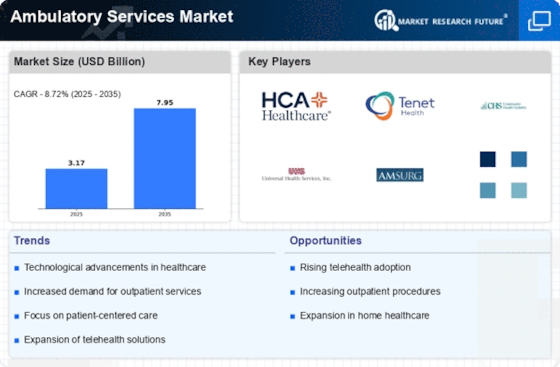Outpatient Services
Emergency Services
Home Healthcare
Diagnostic Services
Private
Public
Non-Profit
Cardiology
Orthopedics
Pediatrics
Gastroenterology
Telemedicine
Mobile Health Applications
Wearable Health Devices
North America
Europe
South America
Asia Pacific
Middle East and Africa
North America Outlook (USD Billion, 2019-2035)
North America Ambulatory Services Market by Service Type
Outpatient Services
Emergency Services
Home Healthcare
Diagnostic Services
North America Ambulatory Services Market by Ownership Type
Private
Public
Non-Profit
North America Ambulatory Services Market by Specialty Type
Cardiology
Orthopedics
Pediatrics
Gastroenterology
North America Ambulatory Services Market by Technology Type
Telemedicine
Mobile Health Applications
Wearable Health Devices
North America Ambulatory Services Market by Regional Type
US
Canada
US Outlook (USD Billion, 2019-2035)
US Ambulatory Services Market by Service Type
Outpatient Services
Emergency Services
Home Healthcare
Diagnostic Services
US Ambulatory Services Market by Ownership Type
Private
Public
Non-Profit
US Ambulatory Services Market by Specialty Type
Cardiology
Orthopedics
Pediatrics
Gastroenterology
US Ambulatory Services Market by Technology Type
Telemedicine
Mobile Health Applications
Wearable Health Devices
CANADA Outlook (USD Billion, 2019-2035)
CANADA Ambulatory Services Market by Service Type
Outpatient Services
Emergency Services
Home Healthcare
Diagnostic Services
CANADA Ambulatory Services Market by Ownership Type
Private
Public
Non-Profit
CANADA Ambulatory Services Market by Specialty Type
Cardiology
Orthopedics
Pediatrics
Gastroenterology
CANADA Ambulatory Services Market by Technology Type
Telemedicine
Mobile Health Applications
Wearable Health Devices
Europe Outlook (USD Billion, 2019-2035)
Europe Ambulatory Services Market by Service Type
Outpatient Services
Emergency Services
Home Healthcare
Diagnostic Services
Europe Ambulatory Services Market by Ownership Type
Private
Public
Non-Profit
Europe Ambulatory Services Market by Specialty Type
Cardiology
Orthopedics
Pediatrics
Gastroenterology
Europe Ambulatory Services Market by Technology Type
Telemedicine
Mobile Health Applications
Wearable Health Devices
Europe Ambulatory Services Market by Regional Type
Germany
UK
France
Russia
Italy
Spain
Rest of Europe
GERMANY Outlook (USD Billion, 2019-2035)
GERMANY Ambulatory Services Market by Service Type
Outpatient Services
Emergency Services
Home Healthcare
Diagnostic Services
GERMANY Ambulatory Services Market by Ownership Type
Private
Public
Non-Profit
GERMANY Ambulatory Services Market by Specialty Type
Cardiology
Orthopedics
Pediatrics
Gastroenterology
GERMANY Ambulatory Services Market by Technology Type
Telemedicine
Mobile Health Applications
Wearable Health Devices
UK Outlook (USD Billion, 2019-2035)
UK Ambulatory Services Market by Service Type
Outpatient Services
Emergency Services
Home Healthcare
Diagnostic Services
UK Ambulatory Services Market by Ownership Type
Private
Public
Non-Profit
UK Ambulatory Services Market by Specialty Type
Cardiology
Orthopedics
Pediatrics
Gastroenterology
UK Ambulatory Services Market by Technology Type
Telemedicine
Mobile Health Applications
Wearable Health Devices
FRANCE Outlook (USD Billion, 2019-2035)
FRANCE Ambulatory Services Market by Service Type
Outpatient Services
Emergency Services
Home Healthcare
Diagnostic Services
FRANCE Ambulatory Services Market by Ownership Type
Private
Public
Non-Profit
FRANCE Ambulatory Services Market by Specialty Type
Cardiology
Orthopedics
Pediatrics
Gastroenterology
FRANCE Ambulatory Services Market by Technology Type
Telemedicine
Mobile Health Applications
Wearable Health Devices
RUSSIA Outlook (USD Billion, 2019-2035)
RUSSIA Ambulatory Services Market by Service Type
Outpatient Services
Emergency Services
Home Healthcare
Diagnostic Services
RUSSIA Ambulatory Services Market by Ownership Type
Private
Public
Non-Profit
RUSSIA Ambulatory Services Market by Specialty Type
Cardiology
Orthopedics
Pediatrics
Gastroenterology
RUSSIA Ambulatory Services Market by Technology Type
Telemedicine
Mobile Health Applications
Wearable Health Devices
ITALY Outlook (USD Billion, 2019-2035)
ITALY Ambulatory Services Market by Service Type
Outpatient Services
Emergency Services
Home Healthcare
Diagnostic Services
ITALY Ambulatory Services Market by Ownership Type
Private
Public
Non-Profit
ITALY Ambulatory Services Market by Specialty Type
Cardiology
Orthopedics
Pediatrics
Gastroenterology
ITALY Ambulatory Services Market by Technology Type
Telemedicine
Mobile Health Applications
Wearable Health Devices
SPAIN Outlook (USD Billion, 2019-2035)
SPAIN Ambulatory Services Market by Service Type
Outpatient Services
Emergency Services
Home Healthcare
Diagnostic Services
SPAIN Ambulatory Services Market by Ownership Type
Private
Public
Non-Profit
SPAIN Ambulatory Services Market by Specialty Type
Cardiology
Orthopedics
Pediatrics
Gastroenterology
SPAIN Ambulatory Services Market by Technology Type
Telemedicine
Mobile Health Applications
Wearable Health Devices
REST OF EUROPE Outlook (USD Billion, 2019-2035)
REST OF EUROPE Ambulatory Services Market by Service Type
Outpatient Services
Emergency Services
Home Healthcare
Diagnostic Services
REST OF EUROPE Ambulatory Services Market by Ownership Type
Private
Public
Non-Profit
REST OF EUROPE Ambulatory Services Market by Specialty Type
Cardiology
Orthopedics
Pediatrics
Gastroenterology
REST OF EUROPE Ambulatory Services Market by Technology Type
Telemedicine
Mobile Health Applications
Wearable Health Devices
APAC Outlook (USD Billion, 2019-2035)
APAC Ambulatory Services Market by Service Type
Outpatient Services
Emergency Services
Home Healthcare
Diagnostic Services
APAC Ambulatory Services Market by Ownership Type
Private
Public
Non-Profit
APAC Ambulatory Services Market by Specialty Type
Cardiology
Orthopedics
Pediatrics
Gastroenterology
APAC Ambulatory Services Market by Technology Type
Telemedicine
Mobile Health Applications
Wearable Health Devices
APAC Ambulatory Services Market by Regional Type
China
India
Japan
South Korea
Malaysia
Thailand
Indonesia
Rest of APAC
CHINA Outlook (USD Billion, 2019-2035)
CHINA Ambulatory Services Market by Service Type
Outpatient Services
Emergency Services
Home Healthcare
Diagnostic Services
CHINA Ambulatory Services Market by Ownership Type
Private
Public
Non-Profit
CHINA Ambulatory Services Market by Specialty Type
Cardiology
Orthopedics
Pediatrics
Gastroenterology
CHINA Ambulatory Services Market by Technology Type
Telemedicine
Mobile Health Applications
Wearable Health Devices
INDIA Outlook (USD Billion, 2019-2035)
INDIA Ambulatory Services Market by Service Type
Outpatient Services
Emergency Services
Home Healthcare
Diagnostic Services
INDIA Ambulatory Services Market by Ownership Type
Private
Public
Non-Profit
INDIA Ambulatory Services Market by Specialty Type
Cardiology
Orthopedics
Pediatrics
Gastroenterology
INDIA Ambulatory Services Market by Technology Type
Telemedicine
Mobile Health Applications
Wearable Health Devices
JAPAN Outlook (USD Billion, 2019-2035)
JAPAN Ambulatory Services Market by Service Type
Outpatient Services
Emergency Services
Home Healthcare
Diagnostic Services
JAPAN Ambulatory Services Market by Ownership Type
Private
Public
Non-Profit
JAPAN Ambulatory Services Market by Specialty Type
Cardiology
Orthopedics
Pediatrics
Gastroenterology
JAPAN Ambulatory Services Market by Technology Type
Telemedicine
Mobile Health Applications
Wearable Health Devices
SOUTH KOREA Outlook (USD Billion, 2019-2035)
SOUTH KOREA Ambulatory Services Market by Service Type
Outpatient Services
Emergency Services
Home Healthcare
Diagnostic Services
SOUTH KOREA Ambulatory Services Market by Ownership Type
Private
Public
Non-Profit
SOUTH KOREA Ambulatory Services Market by Specialty Type
Cardiology
Orthopedics
Pediatrics
Gastroenterology
SOUTH KOREA Ambulatory Services Market by Technology Type
Telemedicine
Mobile Health Applications
Wearable Health Devices
MALAYSIA Outlook (USD Billion, 2019-2035)
MALAYSIA Ambulatory Services Market by Service Type
Outpatient Services
Emergency Services
Home Healthcare
Diagnostic Services
MALAYSIA Ambulatory Services Market by Ownership Type
Private
Public
Non-Profit
MALAYSIA Ambulatory Services Market by Specialty Type
Cardiology
Orthopedics
Pediatrics
Gastroenterology
MALAYSIA Ambulatory Services Market by Technology Type
Telemedicine
Mobile Health Applications
Wearable Health Devices
THAILAND Outlook (USD Billion, 2019-2035)
THAILAND Ambulatory Services Market by Service Type
Outpatient Services
Emergency Services
Home Healthcare
Diagnostic Services
THAILAND Ambulatory Services Market by Ownership Type
Private
Public
Non-Profit
THAILAND Ambulatory Services Market by Specialty Type
Cardiology
Orthopedics
Pediatrics
Gastroenterology
THAILAND Ambulatory Services Market by Technology Type
Telemedicine
Mobile Health Applications
Wearable Health Devices
INDONESIA Outlook (USD Billion, 2019-2035)
INDONESIA Ambulatory Services Market by Service Type
Outpatient Services
Emergency Services
Home Healthcare
Diagnostic Services
INDONESIA Ambulatory Services Market by Ownership Type
Private
Public
Non-Profit
INDONESIA Ambulatory Services Market by Specialty Type
Cardiology
Orthopedics
Pediatrics
Gastroenterology
INDONESIA Ambulatory Services Market by Technology Type
Telemedicine
Mobile Health Applications
Wearable Health Devices
REST OF APAC Outlook (USD Billion, 2019-2035)
REST OF APAC Ambulatory Services Market by Service Type
Outpatient Services
Emergency Services
Home Healthcare
Diagnostic Services
REST OF APAC Ambulatory Services Market by Ownership Type
Private
Public
Non-Profit
REST OF APAC Ambulatory Services Market by Specialty Type
Cardiology
Orthopedics
Pediatrics
Gastroenterology
REST OF APAC Ambulatory Services Market by Technology Type
Telemedicine
Mobile Health Applications
Wearable Health Devices
South America Outlook (USD Billion, 2019-2035)
South America Ambulatory Services Market by Service Type
Outpatient Services
Emergency Services
Home Healthcare
Diagnostic Services
South America Ambulatory Services Market by Ownership Type
Private
Public
Non-Profit
South America Ambulatory Services Market by Specialty Type
Cardiology
Orthopedics
Pediatrics
Gastroenterology
South America Ambulatory Services Market by Technology Type
Telemedicine
Mobile Health Applications
Wearable Health Devices
South America Ambulatory Services Market by Regional Type
Brazil
Mexico
Argentina
Rest of South America
BRAZIL Outlook (USD Billion, 2019-2035)
BRAZIL Ambulatory Services Market by Service Type
Outpatient Services
Emergency Services
Home Healthcare
Diagnostic Services
BRAZIL Ambulatory Services Market by Ownership Type
Private
Public
Non-Profit
BRAZIL Ambulatory Services Market by Specialty Type
Cardiology
Orthopedics
Pediatrics
Gastroenterology
BRAZIL Ambulatory Services Market by Technology Type
Telemedicine
Mobile Health Applications
Wearable Health Devices
MEXICO Outlook (USD Billion, 2019-2035)
MEXICO Ambulatory Services Market by Service Type
Outpatient Services
Emergency Services
Home Healthcare
Diagnostic Services
MEXICO Ambulatory Services Market by Ownership Type
Private
Public
Non-Profit
MEXICO Ambulatory Services Market by Specialty Type
Cardiology
Orthopedics
Pediatrics
Gastroenterology
MEXICO Ambulatory Services Market by Technology Type
Telemedicine
Mobile Health Applications
Wearable Health Devices
ARGENTINA Outlook (USD Billion, 2019-2035)
ARGENTINA Ambulatory Services Market by Service Type
Outpatient Services
Emergency Services
Home Healthcare
Diagnostic Services
ARGENTINA Ambulatory Services Market by Ownership Type
Private
Public
Non-Profit
ARGENTINA Ambulatory Services Market by Specialty Type
Cardiology
Orthopedics
Pediatrics
Gastroenterology
ARGENTINA Ambulatory Services Market by Technology Type
Telemedicine
Mobile Health Applications
Wearable Health Devices
REST OF SOUTH AMERICA Outlook (USD Billion, 2019-2035)
REST OF SOUTH AMERICA Ambulatory Services Market by Service Type
Outpatient Services
Emergency Services
Home Healthcare
Diagnostic Services
REST OF SOUTH AMERICA Ambulatory Services Market by Ownership Type
Private
Public
Non-Profit
REST OF SOUTH AMERICA Ambulatory Services Market by Specialty Type
Cardiology
Orthopedics
Pediatrics
Gastroenterology
REST OF SOUTH AMERICA Ambulatory Services Market by Technology Type
Telemedicine
Mobile Health Applications
Wearable Health Devices
MEA Outlook (USD Billion, 2019-2035)
MEA Ambulatory Services Market by Service Type
Outpatient Services
Emergency Services
Home Healthcare
Diagnostic Services
MEA Ambulatory Services Market by Ownership Type
Private
Public
Non-Profit
MEA Ambulatory Services Market by Specialty Type
Cardiology
Orthopedics
Pediatrics
Gastroenterology
MEA Ambulatory Services Market by Technology Type
Telemedicine
Mobile Health Applications
Wearable Health Devices
MEA Ambulatory Services Market by Regional Type
GCC Countries
South Africa
Rest of MEA
GCC COUNTRIES Outlook (USD Billion, 2019-2035)
GCC COUNTRIES Ambulatory Services Market by Service Type
Outpatient Services
Emergency Services
Home Healthcare
Diagnostic Services
GCC COUNTRIES Ambulatory Services Market by Ownership Type
Private
Public
Non-Profit
GCC COUNTRIES Ambulatory Services Market by Specialty Type
Cardiology
Orthopedics
Pediatrics
Gastroenterology
GCC COUNTRIES Ambulatory Services Market by Technology Type
Telemedicine
Mobile Health Applications
Wearable Health Devices
SOUTH AFRICA Outlook (USD Billion, 2019-2035)
SOUTH AFRICA Ambulatory Services Market by Service Type
Outpatient Services
Emergency Services
Home Healthcare
Diagnostic Services
SOUTH AFRICA Ambulatory Services Market by Ownership Type
Private
Public
Non-Profit
SOUTH AFRICA Ambulatory Services Market by Specialty Type
Cardiology
Orthopedics
Pediatrics
Gastroenterology
SOUTH AFRICA Ambulatory Services Market by Technology Type
Telemedicine
Mobile Health Applications
Wearable Health Devices
REST OF MEA Outlook (USD Billion, 2019-2035)
REST OF MEA Ambulatory Services Market by Service Type
Outpatient Services
Emergency Services
Home Healthcare
Diagnostic Services
REST OF MEA Ambulatory Services Market by Ownership Type
Private
Public
Non-Profit
REST OF MEA Ambulatory Services Market by Specialty Type
Cardiology
Orthopedics
Pediatrics
Gastroenterology
REST OF MEA Ambulatory Services Market by Technology Type
Telemedicine
Mobile Health Applications
Wearable Health Devices


















Leave a Comment